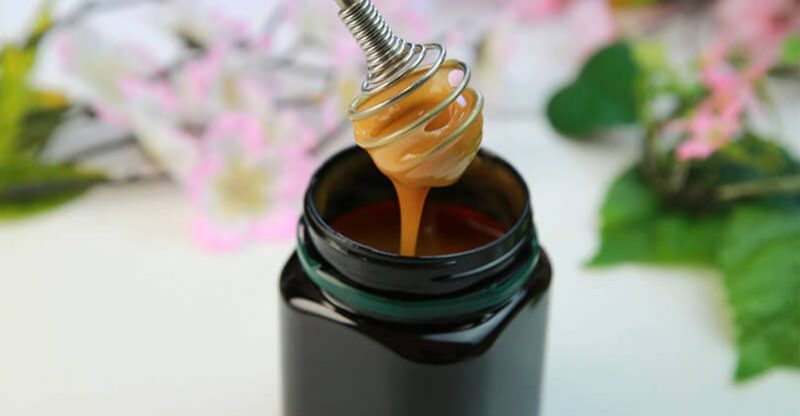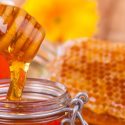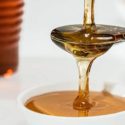5 Amazing Health Benefits Of Medical Grade Manuka Honey
1. Understanding Manuka Honey: What Are K Factor and UMF?
Manuka honey is no ordinary honey. If honey is considered a superfood with many therapeutic and healing effects, Manuka honey has all these powers amped up to the next level. There are different qualities (or grades) of Manuka honey, based on its therapeutic and healing effects.
Two primary designations have been established to compare different batches of Manuka honey. Understanding these different labels will help you to pick the best Manuka honey for your needs. These two labels are K Factor and UMF. Let us learn about these two in a bit more detail:

A. Unique Manuka Factor, or UMF
This is one of the most commonly used labels for Manuka honey. UMF is a quality trademark, available only to genuine Manuka honey manufacturers based in New Zealand. You have to pass stringent quality standards to be eligible to carry this label.
The grading process looks at presence and levels of various active ingredients in a batch of Manuka honey, including:
- Methylglyoxal
- NPA
- Leptosperin
- Dihydroxyacetone (DHA)
UMF grades usually start at 10+ and extend all the way up to 20+ and beyond. The higher the grade, the more the therapeutic power of that honey.
B. K Factor
K Factor is less common grading system, pioneered mainly by a Manuka brand called Wedderspoon Company. It is almost identical to the term “Active Manuka” used vaguely by many brands on the market to promote their product.
K Factor or Active Manuka is measured using the following factors:
- Pollen count
- Live enzymes
- Purity levels
- Chemical residues
- Antioxidants
- pH levels
No products found.
2. Manuka Honey Vs. Regular Honey: Which Is Better And Why?
Regular raw organic honey is a highly celebrated superfood. Health conscious individuals adore this energy-rich food for the myriad benefits it provides to the body, with minimal to zero side effects. And it also tastes great, which is why people increasingly prefer it as a healthier alternative to plain sugar.
But Manuka honey, which is fast gaining attention for its high healing effects, has some marked differences, both in taste, physical properties, and powers. Let examine in detail these differences between raw and Manuka honey:
A. Primary Difference Between Manuka Honey & Ordinary Raw Honey
First, let us look at the basics of each type of honey. Ordinary raw honey is the liquid nectar created by bees in their beehives. This honey exists in its natural state even after extraction. The raw label indicates that it has undergone zero processing, pasteurization, or filtration after its extraction.
This honey can be produced anywhere in the world. Manuka honey is a particular kind of raw honey, made by bees living in hives close to a unique species of plant called the Manuka plant. This shrub is native to New Zealand and some parts of Austalia.
Manuka honey is created by placing the beehives close to areas dominated by the Manuka trees/plants. Manuka honey is thicker than ordinary raw honey and has a gel-like consistency. But it can turn to a liquid state when you stir it.
B. Advanced Differences Between Manuka Honey & Raw Honey
Manuka Honey
The nectar of this honey has to be extracted from one plant, the Manuka. So it does not contain a blend of nectars from different plants. The chemical composition of such honey will be more uniform. Owing to the unique qualities of Manuka plant nectar, Manuka honey contains more healing powers than regular honey.
This includes a higher concentration of a special antibacterial compound called methylglyoxal (MGO). Unlike the active ingredients in regular honey, MGO is not affected by heating. So it remains intact in the final product even after the Manuka honey has been processed using heat treatments.
No products found.
Raw Honey
Generic raw honey is created by using the nectar from a wide range of plants. So it has the potential to contain more bioactive compounds that honey produced from the nectar of a single plant. And since raw honey is not heat treated, these compounds remain intact in the final product.
But since the number and type of different plants used can vary greatly, the ratio of bioactive compounds in different batches of raw honey can show greater fluctuation. But raw honey does usually contain a higher percentage of the following active ingredients than Manuka honey:
- A peptide called bee-defensin, very potent antibacterial agent
- Polyphenols like catechin and caffeic acid, excellent antioxidants
C. Which is better: Raw or Manuka honey?
From the above comparison, it is abundantly clear that both regular raw honey and Manuka honey has plenty of beneficial compounds like antibacterials and antioxidants in them. Both types can have beneficial effects on your body.
But Manuka honey is more consistent regarding active ingredient levels. And it is also rigorously tested for its anti-bacterial effect. But since MGO is resistant to heat, Manuka honey tends to have lesser bee-defensin and polyphenols (as many manufacturers heat treat the honey).
Raw honey has a higher concentration of polyphenols and peptides, but can severely lack in consistency. The ratio can vary massively depending on the type of plants used, and there is also a lack of specific testing protocols to identify the contents.
So, you cannot accurately guarantee the healing or therapeutic effects of raw honey. So the choice depends on your needs. If you want a great tasting honey with some health benefits, raw honey is often the better choice. But if you want honey with unique and consistent therapeutic powers, Manuka honey is the better choice.
3. Manuka Honey Effect On Colds And Cough
Honey is a traditional remedy for colds and coughs across the world. Its benefits and healing effects of these diseases are well understood and have survived the test of time. Honey has been used since ancient times as a remedy for these conditions.
You may have even been given honey in your childhood for this purpose, by your mother or grandmother. But now, modern research has uncovered clinical evidence of the therapeutic effects of honey for colds and cough.
Endorsement for Usage of Regular Honey
Honey is solidly backed by esteemed organizations like the American Academy of Pediatrics and the World Health Organization as a cure for cough symptoms. And when they talk about honey, they mean all kinds of honey, including Manuka honey.
The WHO has even advocated using honey instead of cough medication in developing countries, where medicines might be in short supply.
Scientific Evidence For Effects of Regular Honey On Cough
A US study discovered that honey is better than other treatment options for cold symptoms. According to their results, it is better than OTC cold remedies in treating these symptoms. Another research in 2012 on children dealing with a nighttime cough revealed similar results.
Three medications were tested along with a placebo. All three remedies contained various types of honey, of which one was found to be highly effective against a cough. The high incidence of antibacterial and antioxidant compounds in honey is thought to be responsible for these effects.
No products found.
Is Manuka Honey Effective Against Cough and Cold?
This brings us back to the original question, is Manuka as effective as generic honey? In the previous sections, we noted how Manuka honey has more consistency than raw honey when it comes to its antibacterial content. And in the following sections, we noted how organizations like the WHO support honey, any honey, as a possible cure for a cough and cold.
Remeber that they were talking about all types of honey, not just organic raw honey. And we have here clear evidence that Manuka honey is equal to, or better than raw honey in antimicrobial and antioxidant content.
Draw all these facts together, and we can safely arrive at a conclusion: if ordinary honey can handle something like a cough and cold, you can rest assured that Manuka honey will do a much better job.
Using Manuka Honey To Treat Cold And Cough
Now that we have convincing evidence that Manuka honey is more than capable of kicking cold and cough out of on your body let us look at how you can use this as a remedy.
Conventional wisdom and expert opinion both agree that honey should be taken alone for best therapeutic benefits during a cough and cold.
When using unique Manuka honey, follow a strict dosage:
- Adults should take one teaspoon of Manuka honey four times a day.
- Children can be given one teaspoon Manuka honey once a day before bedtime, but to be safe, refer to your doctor first.
- Infants under the age of one year should not be given Manuka honey.
Always ensure that you purchase the most reliable, highest quality certified Manuka honey for best results.
4. Manuka Honey and Sore Throat
A sore throat is a widespread malady, most often caused by a viral or bacterial infection. If you have sym[toms like chills, headache, and fever, the chances are high that it is a virus. The sad thing here is that there is no practical cure for such viral infections.
But on the plus side, the infection will usually go away on its own in a couple of weeks. You can get by with a few painkillers for the discomfort.
Bacterial infections are usually more severe, as they can give rise to complications like rheumatic fever. Antibiotics are the most common treatment option, but excessive use of these can lead to drug-resistant strains of the bug.
Antibacterials also kill off the good bacteria in your system. So, a safer, natural antibacterial option is highly desirable when dealing with conditions like a sore throat. And Manuka honey can be precisely that.
Some Interesting Factors About Manuka Honey
- 100% natural honey with zero known side effects
- Rich in vitamins, amino acids, and minerals like zinc, copper, potassium, sodium, phosphorus, iron, manganese
- Rich in antiseptics like hydrogen peroxide and DHA
- Also know for its non-peroxide antibiotic activity, due to MGO
- Has both antibacterial and anti-inflammatory effects
- More enzymes and four times more nutrition than regular honey
- Highly stable
- Authenticity can be measured using UMF grading
- Slightly more expensive than regular honey
Great, But Does It Work Against Sore Throat?
To consider that, you must first find out if the sore throat is viral or bacterial. Get it checked by a doctor to figure that out accurately. If it is bacterial, keep in mind all the problems associated with using synthetic antibiotics on a regular basis.
You can expect the Manuka honey to work against a sore throat in the following ways:
- A sore throat is usually caused by Streptococcus bacteria. These are incredibly aggressive bugs, but they are very vulnerable to the active ingredients in Manuka honey.
- For instance, MGO is only found in Manuka honey and has a broad-spectrum antibacterial effect. Lab tests indicate that it will kill these streptococcus bacteria.
- And since Manuka honey is all natural, you will not face any side effects commonly associated with the medication.
- Throat infections lead to inflammation of the tonsils and pharynx, causing pain and discomfort. Manuka honey has an anti-inflammatory effect, and thus relieves the pain and swelling in this region efficiently.
- Manuka honey also has a strong immune-boosting effect, thanks to the presence of compounds like Apisimin and Arabinogalactan. They will help keep you strong during the infection.
Manuka Honey Dosage For Sore Throat
Though it has strong therapeutic effects, Manuka honey is a food. You can take it regularly to enjoy its healing effects. If you want to maintain a specific routine, try the following ways:
- Take this honey on a slice of bread every day as a preventive measure to keep a sore throat away.
- When you already have a sore throat, consume one teaspoon of Manuka honey thrice a day for maximum effect.
- You may also take it dissolved in hot water with a squeeze of lemon juice. This will cure sore throat symptoms and keep you well hydrated at the same time.
But Is It Safe For Everybody?
Yes, Manuka honey is entirely safe for human consumption. For better therapeutic effect, check the UMF+ rating. Anything above 10+ is required as a minimum. But tread cautiously when considering Manuka honey as a treatment option for the following individuals:
- No honey is deemed to be safe for children below one year of age. And this includes Manuka honey.
- If anybody has an allergy to bees or pollen, they should undergo a patch test before taking Manuka honey.
- Since Manuka honey contains sugar, people with diabetes should also be cautious when using this product.
5. Manuka Honey For Burns And Wounds
Regular honey is extremely popular as a remedy for all kinds of skin injuries, like wounds, cuts, and burns. Traditional medicine in China, India and Ancient Egypt extensively used it. Let's check if Manuka honey shares these same properties as regular honey.
Should I Use Manuka Honey Instead Of Regular Honey?
For starters, while honey is excellent for healing wounds and burns, you should not be applying any honey on injuries. Not all honey is created equally when it comes to healing effects. While some are better than others, none can compare to Manuka regarding healing capabilities.
Even the US FDA has approved of this fact and recommends it as a good wound treatment method.
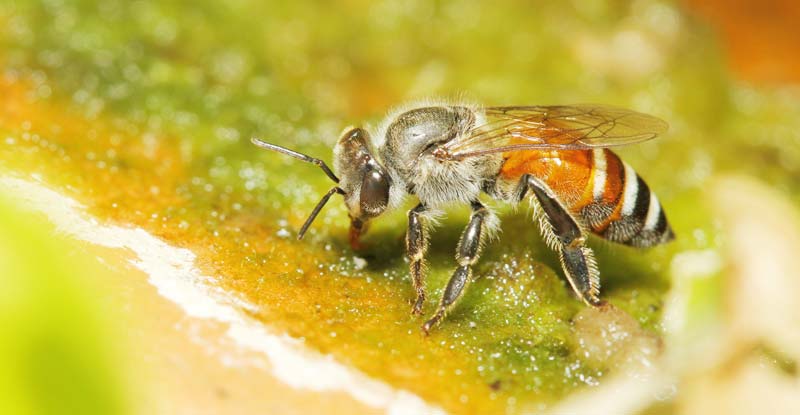
Okay, But What ABout Evidence?
There is plenty of evidence regarding the healing powers of Manuka honey. Two studies stand out because of the surprising results. The first study, published in the International Journal of Lower Extremity Wounds, discovered that Manuka honey has unique healing effects.
These effects are so unique that they were not available in any of the modern treatments. These included the following:
- Clear anti-inflammatory impact
- Dramatic reduction in permanent scarring
- Odor control at the wound area
- Prevention of infection spread from the wounds
The second study, conducted at the University of Auckland used data from numerous clinical trials to prove that Manuka honey healed wounds faster than regular dressings.
So How Does Manuka Honey Manage All This?
There are three significant reasons why Manuka honey is superior to most modern wound treatment and dressing options. They are:
High Osmolality:
Manuka honey has a high saturation of sugars. They have a strong interaction with water molecules at the wound area. Free water is needed for germs to grow, and Manuka prevents that from happening.
Hydrogen Peroxide:
this compound is a well-known antiseptic commonly used in many cleaning solutions and sterilizing liquids. The glucose oxidase in Manuka honey creates hydrogen peroxide when it comes into contact with body fluids at the wound area. This kills all bacteria in the area.
Phytochemicals:
These are also potent antibacterials, and Manuka honey contains these compounds in higher concentration when compared to other types of honey.
How To Use Manuka Honey In Wound And Burn Dressings
For less severe burns and shallow wounds, smear the honey evenly over the affected area. Another option is to rub some Manuka honey on a wound dressing and then apply that to the wound. If you don't want to do all that, you can also look for wound dressings with Manuka honey at your pharmacy.
For deeper wounds, smear the honey liberally over the affected area and then apply the dressing.
6. Manuka Honey Cosmetic Benefits For Your Skin
The healing effects of Manuka honey also extend into the realm of skincare. If you want a natural component to improve skin health and beauty, this honey should be the first thing you try. It has started featuring heavily in the top-rated skincare and cosmetic products available on the market these days.
Skincare Benefits From Manuka Honey
There are four significant benefits to your skin from using Manuka honey. They are:
Anti Aging Effect:
Manuka honey contains the richest concentration of methylglyoxal or MGO. This compound has string anti-aging effects. MGO promotes cross-links in your skin collagen, improving the structural growth of your skin cells. And when you have healthier collagen, that means that your skin will look firmer, smoother, and younger.
Fights Acne:
Acne is usually the result of a species of bacterium invading your skin pores, causing inflammation and redness. And we know by now that Manuka honey has strong antibacterial effects. So Manuka honey can heal existing acne, and also prevent future breakouts from happening.
Removing Blemishes:
The imperfections like blemishes on your face are often a result of bacterial inflammation as well. And Manuka honey has a strong healing effect on these conditions. And the presence of amino acids in this honey ensures that your pores remain healthy and clear of dead cells.
Moisturizes:
Honey is a natural humectant, meaning it can draw moisture to itself. And Manuka honey also has this effect on your skin, drawing moisture from the surroundings and atmosphere to keep your skin hydrated. A well-hydrated skin is a healthy and beautiful skin.
The honey also has some minor additional benefits, which can be seen below:
- Strong antifungal effect cures conditions like yeast infection and athlete’s foot
- Cures dangerous infections like MRSA and Staph on your skin
- Heals conditions like eczema and psoriasis
- Treats burns and cuts
- Reduces skin redness
- Provides a healthy balance of beneficial bacteria on the skin
- Has painkilling effect on bruises
How To Use Manuka For Skincare
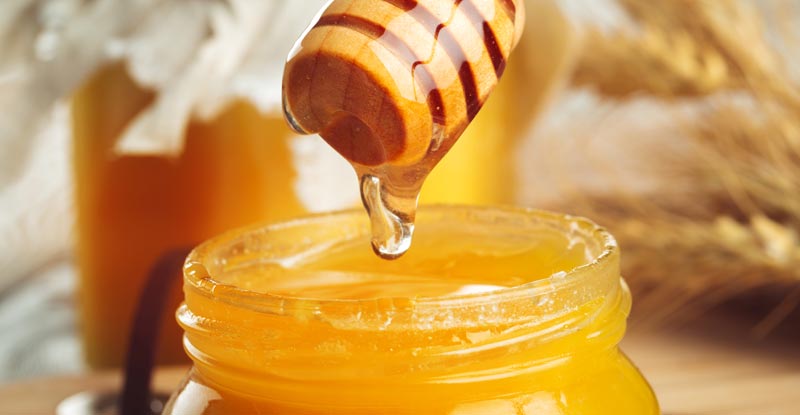
A facemask is one of the simplest ways to get all the benefits of Manuka on your skin. A healing and nourishing face mask with Manuka honey can be easily crafted at your home. Try the following steps:
- Prep your face by washing it and the pat drying
- Do not use any moisturizer
- Apply a spoonful of Manuka honey on your face and gently massage it in
- Avoid your eyes hairline and mouth, and smooth it evenly over the rest
- Leave this mask on for 30 minutes
- Wash the mask off using some warm water
- Pat dry with a towel
- Repeat the process often for best results
How Long Before Results Manifest?
You can expect visible results in just 3-4 days, under normal circumstances. If you have acne, you can expect those to disappear at the same time. Since Manuka honey has potent anti-aging effects, continue using this face pack as a preventive measure to keep your skin young and vibrant. Try using UMF+ 12 or higher rated Manuka honey for best results.
7. Things To Know About Manuka Honey & Pregnancy
Pregnancy is a crucial stage for any woman's life. What you eat and drink during this period can have a massive impact on the health of your child. Always try to include the best nutrients in your diet to help your baby’s growth and development.
And Manuka honey has high enzyme activity, which makes it a potent health booster.
Some Pertinent Factors About Manuka Honey
- 100% natural product with no chemicals or toxins
- Contains unique active ingredients not found in other honey
- Rich in vital nutrients and minerals like iron, zinc, potassium, and vitamins
- Antibacterial and anti-inflammatory effects
- No known side effects
Thanks to all these factors, the following things can be confidently asserted regarding use of Manuka honey during and after pregnancy:
- Harmless and safe for consumption during pregnancy
- Harmless and safe while breastfeeding
- Safe to apply on the skin of your baby
- Not safe for use for infants under 12 months
What Are The Benefits Of Manuka Honey For Pregnant Women?
Pregnancy is a stage filled with painful and irritating conditions. One among this is a sore throat. And as we have already examined earlier, Manuka honey is better than regular honey at handling sore throat symptoms.
And since pregnant women are better off taking as less medication as possible for the health of the fetus, natural Manuka honey is a safe and effective alternative.
Reduces Allergies
A vast majority of people suffer from some allergy during their life. And we also use allergy medication, which can have potential side effects. Allergy symptoms during pregnancy are more troubling, as you have to be careful about using medicines with side effects. Manuka honey may be a safer alternative, but it is recommended that you seek expert medical opinion before using it.
Relief from Heartburn
For most women who have been pregnant at some point in their lives, heartburn is one of the worst symptoms they had to deal with. Hormonal fluctuations during pregnancy are considered as the main reason for this condition. Manuka honey can provide quick relief from these gastric effects. Consume one glass of milk with a teaspoon of Manuka honey mixed in it.
Nausea and Morning Sickness
All women suffer from this during their pregnancies. And it is also hazardous, as you can end up without an appetite. Loss of appetite is terrible because you need more nutrition when you are pregnant.
Manuka honey is an excellent choice here because it effectively suppresses any nausea or vomiting sensations. It also acts as a nutritional supplement.
But, Is It Really Safe For Pregnant Women?
Yes, Manuka honey is considered completely safe for almost all women during pregnancy. But as in the case of everything, there are some notable exceptions:
- Women allergic to honey, bees, or pollen should stay away from Manuka honey
- People with diabetes should be extra careful with all kinds of honey, including Manuka honey.
That is why it is called superfood, Manuka honey would have to be considered a “mega food” or something of that order! It is that good.
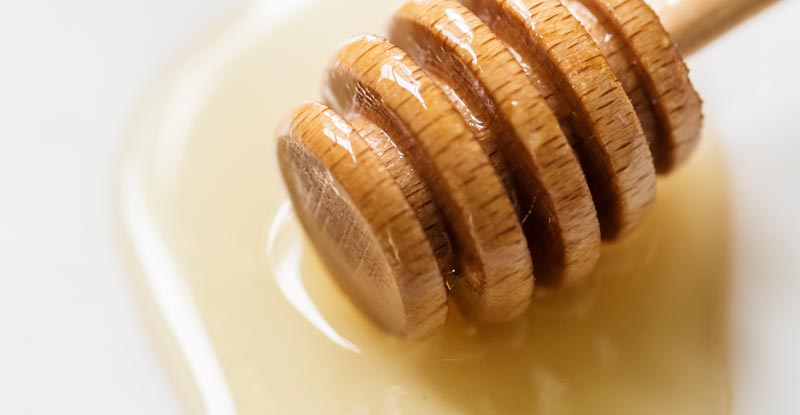
Just make sure that you are using medical grade Manuka honey for maximum health benefits. Look at the UMF+ factor. Anything above 10-15 is considered the best. And remember to carefully choose your brand, as there are many fakes in the business trying to fleece people.
Last update on 2024-04-23 at 23:13 / Affiliate links / Images from Amazon Product Advertising API

